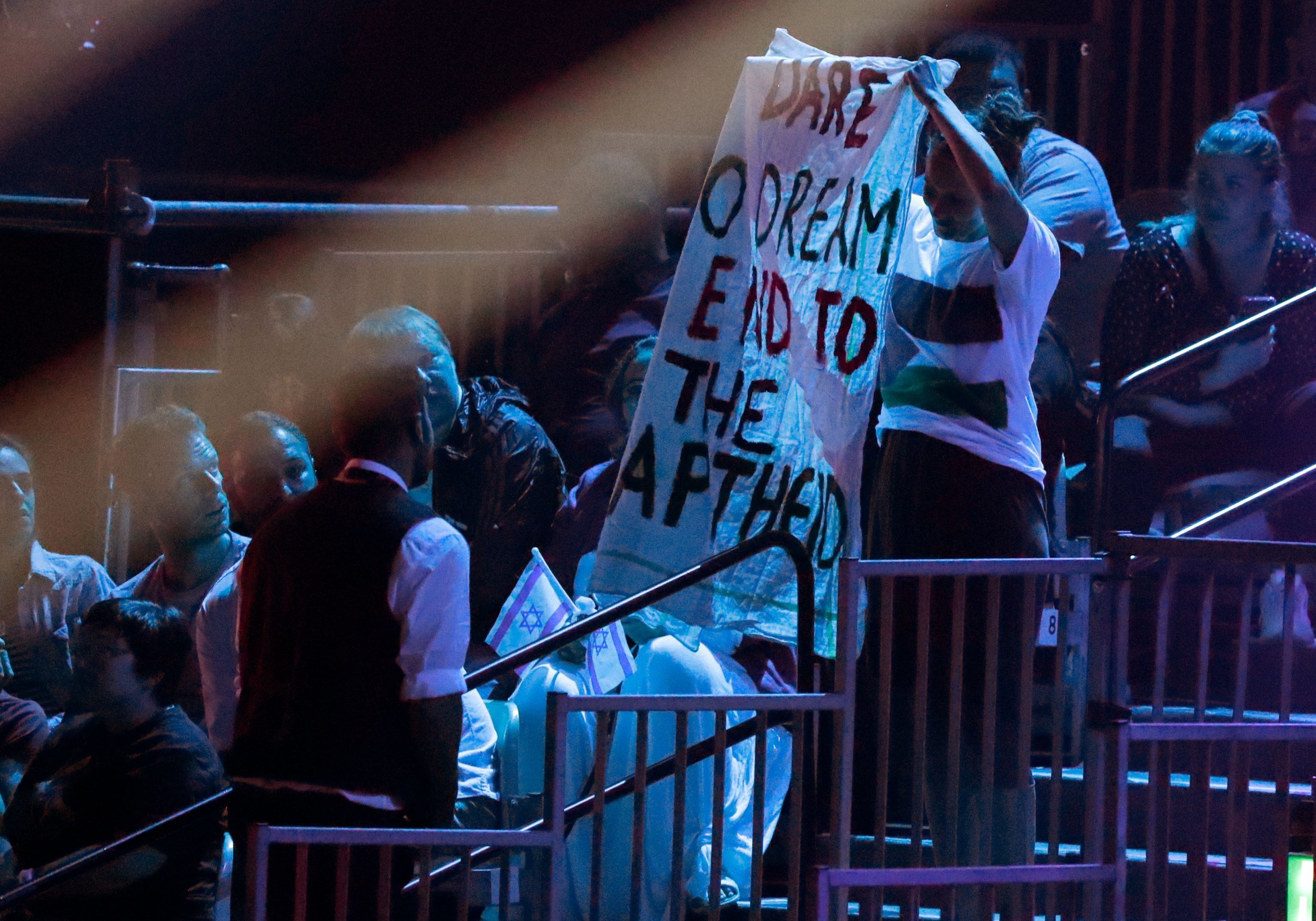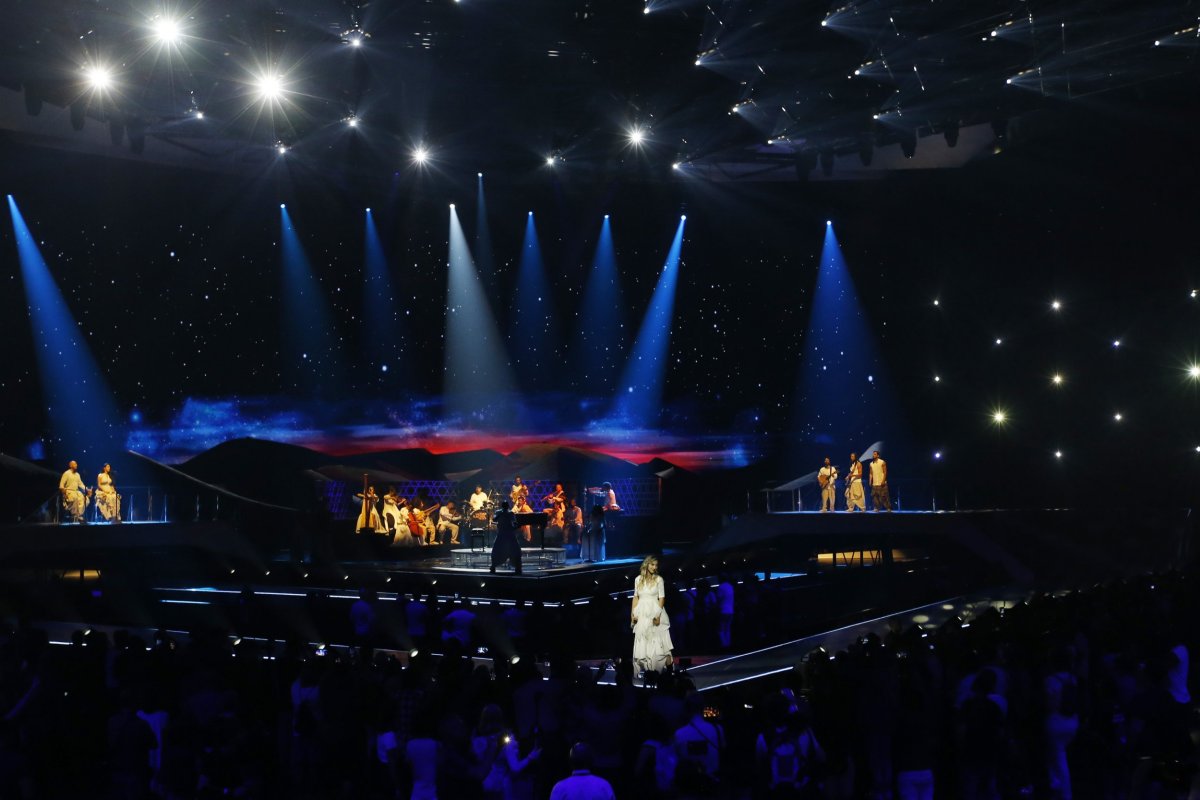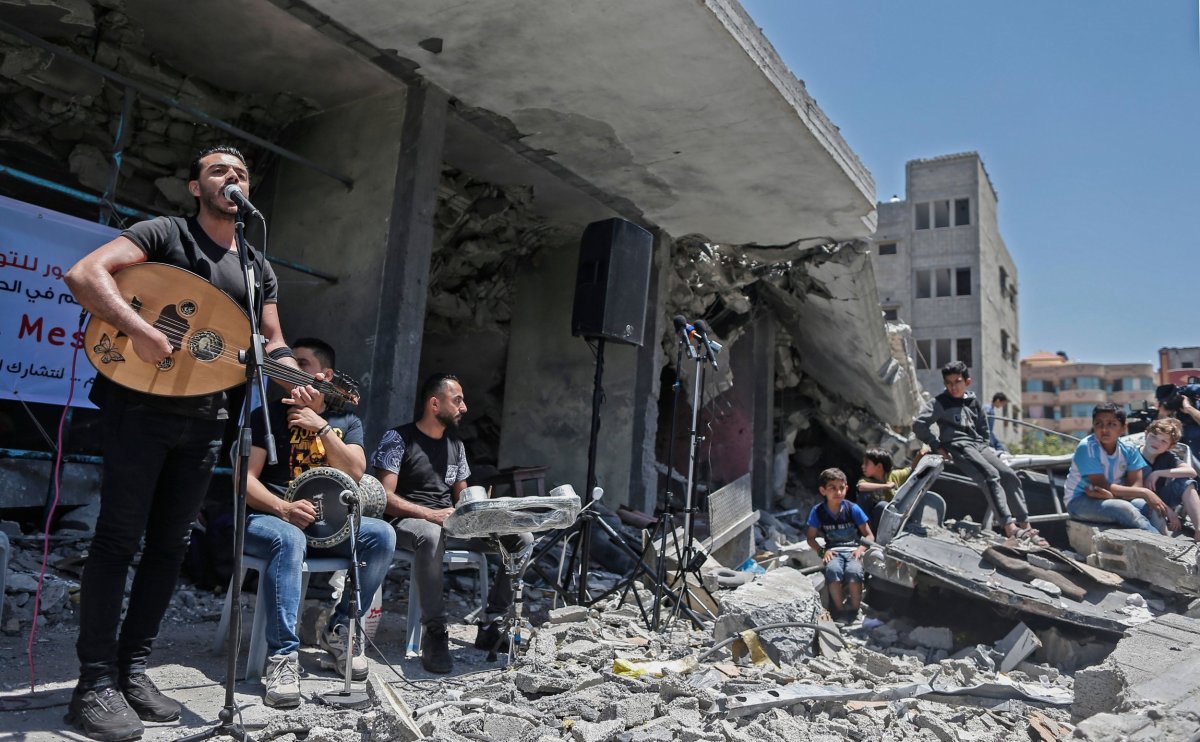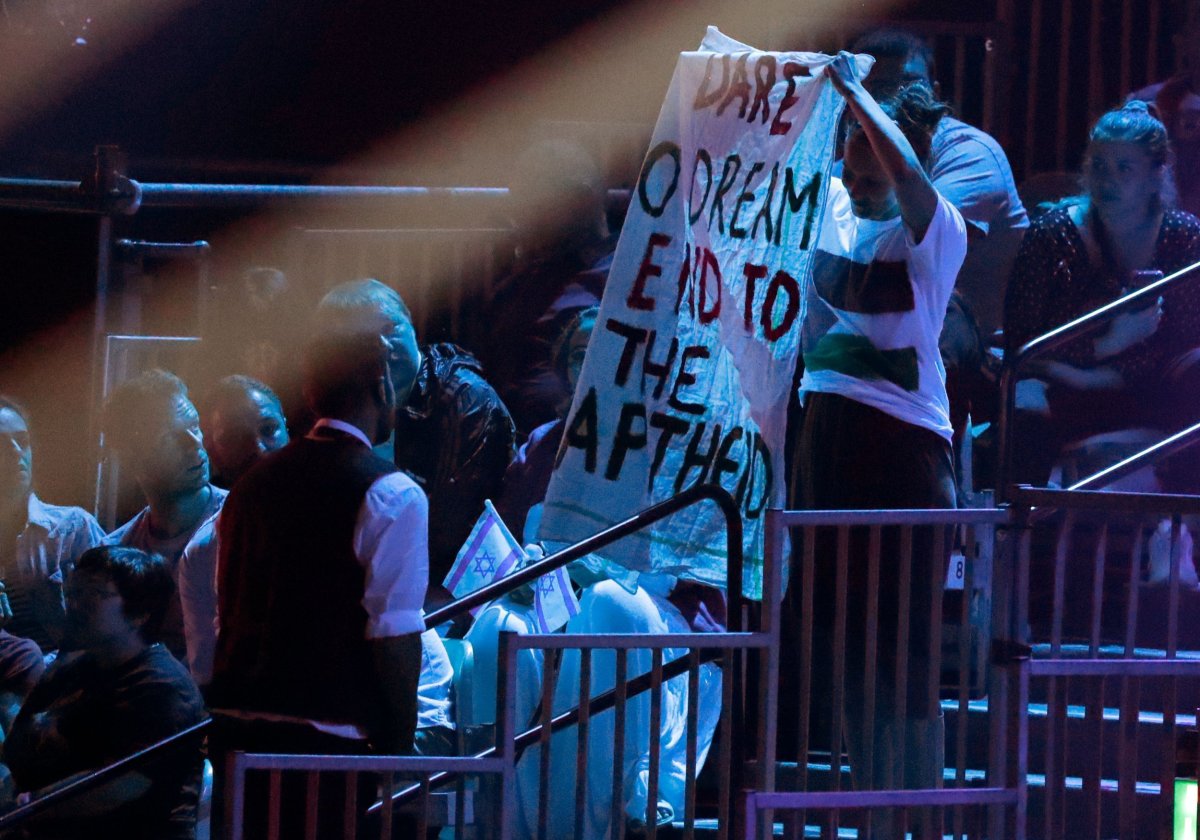
International performers have gathered in Tel Aviv for one of the world's most popular talent shows, but the 2019 Eurovision Song Contest comes after a spike in violence that has defined the decades-long conflict between Israelis and Palestinians.
The singing contest is just one of many high-profile events occurring in the Middle East this May, a month marked with a great deal of history for Israel, a young country with borders that have still yet to be defined. On Tuesday, Israel celebrated its 71st Independence Day, marking the beginning of the world's only Jewish-majority country. On Wednesday, Palestinians also recognized the 71st anniversary of the Nakba, referring to the "catastrophe" ensuing from the mass displacement of Palestinians that reflected a very different history of Israel's founding in 1948.
The dueling narratives have become an intrinsic part of Israel's image, both at home and abroad, and clashes between the two sides turned fatal earlier this month. Several Palestinians were killed while demonstrating at the border of the Gaza Strip and in airstrikes, to which Islamist Palestinian militant group Hamas responded with its biggest barrage of rockets against Israel since the two sides went to war in 2014. Israel responded with its own massive show of force, causing death and destruction in new airstrikes on the small Palestinian-controlled enclave.
Then, however, came a quick calm, a rare occurrence in the storied Israeli-Palestinian conflict. And while Eurovision may come to dominate international coverage of Israel on Saturday, at home, peace is as far away as ever.

Ido Aharoni, a former soldier with 25 year of service at the Israeli Foreign Ministry and who recently served as Israel's consul general in New York, told Newsweek that, "Israel's overall security doctrine, established in the early days of the state, proved to be a big success."
He identified the three main branches of this strategy asbuilding a big military, pre-emptive strikes and deterring threats via advanced weapons systems, such as the Iron Dome that intercepted a number of incoming rockets earlier this month.
Aharoni claimed Palestinians adopted a "soft underbelly doctrine," which he described as, "Attacking Israel, not necessarily in order to destroy the country, but to effectively diminish the value of its brand and its main civilian assets." Such targets, he said, include Israel's "seven consecutive record-breaking years in tourism, dramatic rise in direct foreign investment and global recognition in the country's creative prowess."
Eurovision, thus created a perfect opportunity to strike, Aharoni argued. Israel made its Eurovision debut in 1973 and scored its first title in 1978. It hosted the following year and won again, but the 1980 Eurovision contest ended up being held in The Hague, however, as Israel declined due to budgetary reasons. It won again in 1998 and hosted the 1999 event, followed by Israeli singer Netta's most recent win in Portugal last year.
With some 200 million viewers worldwide and what The Times of Israel reported to be a boost of 10,000 tourists, the 64-year-old competition between dozens of mostly European countries—but also including Israel, Morocco and, in recent years, Australia—is a lively representation of Israel's commercial success.
Butthe recent rocket strikes, which killed four people and injured several more, may have sought to exploit this success.
Israel's military response killed up to 25 Palestinians, which reportedly included two children, a pregnant woman and a mid-level Hamas operative. Aharoni said Israel's detractors hoped for a more "disproportionate response" in an attempt to discredit Israel ahead of the contest.
"Israel had to display maximum restraint to avoid military escalation in the face of growing internal push for harsher response," Aharoni said.
Diana Buttu, a lawyer and former spokesperson for the Palestine Liberation Organization, told Newsweek, however, that, "what Israel is doing can hardly be classified as 'restraint' nor was it done to salvage a failing Eurovision." Moreover, she said it "was important to both understand the chronology and Israel's actions."

The recent tit-for-tat escalations between the two sides accompanied a more than year-long series of weekly demonstrations called the "Great March of Return." Palestinian protestors on the Gaza border have demanded they be able to live on the lands they inhabited before the establishment of Israel and the subsequent conflicts that led to a shift in the disputed region's demographics.
Israel, backed by top international ally the U.S., has blamed much of the region's unrest on Hamas, while others, such as the United Nations Human Rights Council—from which the U.S. has recently withdrawn, partially due to a perceived anti-Israel bias—have blamed Israel for opening fire on protestors, killing some 300 since last year, according to Gaza's Health Ministry. Many of these casualties came last May, when—just three days after Israel won the Eurovision 2018 contest in Portugal—Palestinians suffered their deadliest day since the 2014 war.
Buttu disputed the fact that Israeli security forces fired in self-defense and argued that, "Israel has faced absolutely no consequences for these murders and continues to kill with impunity."
"Failing to understand that Israel has continued to impose a brutal siege on Gaza for more than 13 years while also gunning down those who seek freedom, will only perpetuate the situation—for without understanding that the root cause of this violence is Israel's military occupation and the international community's failure to end it, one can never understand what is happening in Gaza," she added. "Worse still, by portraying Israeli action as 'restraint' is to only fuel Israel's next bombing campaign."
Israel has launched at least three major wars against Gaza since 2006, the year Hamas won Palestinian elections and one year after Israeli forces disengaged from the roughly 141-square mile strip of nearly 2 million people. Hamas took over the strip in 2007, causing a rift in the ruling Palestinian National Authority. Israel, however, has managed to exert control over much of daily life in Gaza by regulating its boundaries by air, land and sea, citing security concerns.
Gaza's only other land border is with Egypt, which helped to mediate an end to the recent spike in tensions and was one of only two Arab nations to have signed a peace treaty with Israel. Still, signs of the seemingly intractable conflict continued to haunt the country in the lead up to Eurovision.

Even beforethis year's Eurovision contest came to Israel, the country was the subject of an international campaign known as the Boycott, Divest and Sanctions (BDS) movement. Critics of Israel's policies toward Palestinians have pressured artists into canceling shows, a tactic that has seen notable successes, with cancellations from performers including New Zealand singer-songwriter Lorde just last year. Others such as Roger Waters—the U.K.'s Pink Floyd rocker known for his outspoken pro-Palestinian views—have vowed to never play in Israel unless it halts what the U.N. recognizes as an occupation of some Palestinian territories.
Brian Eno, another high-profile artist from the U.K., in support of BDS, has pledged his support for an alternative Eurovision event called "Globalvision" to be held Saturday in the Palestinian city of Ramallah and the largely Arab Israeli city of Haifa as well as abroad in London and Dublin, the Agence France-Presse reported. Another contest called "Gazavision" features local artists also opposing the main event in Tel Aviv.
A petition calling for the European Broadcasting Union to withdraw Israel as a host drew more than 43,000 signatures, but the BDS tacticof boycotts has proved controversial in pro-Israel circles. President Donald Trump's new Special Envoy to Monitor and Combat Anti-Semitism Ellen Carr have likened its tenets to prejudice against people of the Jewish faith. In a rebuke to those seeking to steal the spotlight from Tel Aviv, Israel is set to host Madonna, who defied calls to cancel her appearance.
Theatrics aside, the threat of renewed violence have lingered in Tel Aviv. On Tuesday, the night of Eurovision's first semi-final, the online webstream of Israeli public broadcaster Kan was interrupted by an Israeli military message warning "Risk of Missile Attack Please Take Shelter" along with the sound of sirens that typically accompany a bombardment. The screen then prompted viewers to "take this warning seriously" and depicted simulated explosions over various locations, before cautioning "Israel is not safe, you will see."
Kan quickly dismissed the warnings as fake and the result of a hack. The following day, however, Israel's actual security forces warned of "Palestinians in Gaza violently rioting along Israel's border," claiming some to be armed with incendiary devices and at least one with a grenade, while Gaza's Health Ministry argued Israeli forces were firing live ammunition at demonstrators, setting the stage for a potential new showdown between the two sides.
Uncommon Knowledge
Newsweek is committed to challenging conventional wisdom and finding connections in the search for common ground.
Newsweek is committed to challenging conventional wisdom and finding connections in the search for common ground.
About the writer
Based in his hometown of Staten Island, New York City, Tom O'Connor is an award-winning Senior Writer of Foreign Policy ... Read more
To read how Newsweek uses AI as a newsroom tool, Click here.








